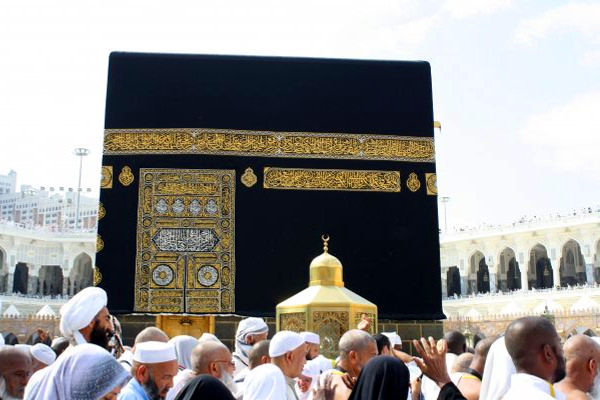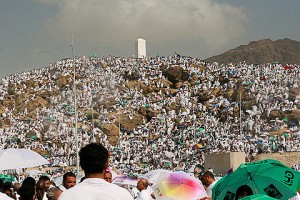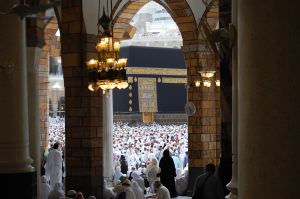Inspiration and Spirituality
Hajj Diary| For the Deepest Love
Published
By
Guests
By Maryam Sakeenah
At the Maqam e Ibrāhīm:
I held on to the golden bars trying to keep my balance, with my nose pressed against the blurry glass screen smeared with many a finger mark. I bolstered up my wits and finally decided to look: footprints in the sands of time, etched into the sacred earth forever by Divine Decree- blessed, immortalized. Ibrāhīm (‘alayhi’l-salām) had stood up and stood out. His standing was an act of worship and intense adoration, an act of courage, resistance, strength, integrity, dignity and true heroism. He laid the foundations of this modest little structure that stands in the heart of Makkah like an immense magnet drawing to itself millions who strive to stand in its shade. In its humble construction, shorn of all grandeur and ostentation, it inspires an inexplicable awe and reverence; giving direction and focus, unifying, holding together, reminding. Ibrāhīm’s was a labor of love. The builders had prayed, “Our Lord! Accept this from us! Indeed You are the Hearing, the Knowing. Our Lord! Make us Muslims [in submission] to You and from our descendants a Muslim nation [in submission] to You.” (2:128)
Keep supporting MuslimMatters for the sake of Allah
Alhamdulillah, we're at over 850 supporters. Help us get to 900 supporters this month. All it takes is a small gift from a reader like you to keep us going, for just $2 / month.
The Prophet (SAW) has taught us the best of deeds are those that done consistently, even if they are small. Click here to support MuslimMatters with a monthly donation of $2 per month. Set it and collect blessings from Allah (swt) for the khayr you're supporting without thinking about it.
Ibrāhīm (‘alayhi’l-salām) had questioned, wondered, reflected. He had thirsted for the Truth and sought the Light that rends all shrouding darkness. He had refused ordinariness, refused to follow the crowd- stood up and stood out, facing the winds alone. He had Loved-truly, settling for nothing lesser than the perfection, wholeness, sublimity of Al-Ḥaqq (The Truth). In the darkness of the night he beheld the shining star, and in his very human search for the Object of the deepest Love the human heart is capable of, he said, “‘This is my Lord.’ But when it set, he said, ‘I do not love those who fade away.’”(6:77) He had loved passionately through hardship, suffering and trial, and attained the Pleasure of Allāh, so that the place of his standing- this stone I beheld through the blurry screen- became sacred, hallowed ground; the endeavor of his hands and limbs became a ritual of worship observed by billions here forevermore.
Ibrāhīm (‘alayhi’l-salām) had stood alone to confront and expose falsehood that his innate fiṭrah had rejected, all the while ‘seeking the Face of His Lord.’ He was sensitive and honest to the Divine Essence breathed into the heart of man, which testifies to Monotheism. Today, as I look around at this immense unending crowd vying to stand where he stood, seeking to be honored by walking the path he walked, I am educated in the meaning of leadership.
While on the theme of leadership, there cannot be a legacy more venerable, more awe-inspiring, powerful and enduring. Some wise old man said something to the effect that when you stand up for the truth against the odds, the whole universe conspires in your favor, because that truth you strive to establish is written in the heart of the earth; it is destiny.
The man whose footprint I beheld is acknowledged as the spiritual progenitor in all monotheistic traditions. Islam claims a direct link with Ibrāhīm (‘alayhi’l-salām) not through race or geography but primarily on account of theology, as its simple Monotheism of ‘La ilaha ilallah’ (no god but Allāh) is the ‘Way of your father Abraham’ (22:78).
Catching a Glimpse of Jabal Nūr in the distance…
Years passed and the heart and mind of man was clouded again by ignorance while Ibrāhīm (‘alayhi’l-salām)’s legacy existed only as dusty remnants and soulless rituals. From the shadows of jāhiliyyah (Ignorance) emerged again a soul restive in search of the Whole Truth, refusing these untruths and half truths, attentive to the inner voice that had impelled Ibrāhīm’s struggle. It was convinced that the Truth lay waiting to be discovered. Not far from the Ka’bah stands Jabal Nūr, the Mountain of Light… Muḥammad (ṣallallāhu ‘alayhi wa sallam) ascended its steep, stony incline to isolate himself from a society that had lost its discrimination of right and wrong, in order to contemplate the truth, seek out answers and pray to the One God of Ibrāhīm (‘alayhi’l-salām). Muḥammad (ṣallallāhu ‘alayhi wa sallam), the devoted follower of Ibrāhīm’s (‘alayhi’l-salām) honest creed was chosen to lead, and Jabal Nūr irradiated the world with God’s final revelation.
From Makkah to Madīnah
I am on the way from Makkah- the native city of Muḥammad (ṣallallāhu ‘alayhi wa sallam)- to Madīnah where he had sought refuge. While reclining on the cushioned seat of an air-conditioned bus, I gaze outside to see rugged mountains and a forbidding, hostile landscape- barren and treeless, with the desert sun mercilessly streaming down red hot. Roughly 1431 years ago, Muhammad (ṣallallāhu ‘alayhi wa sallam) and his followers had made the same journey in conditions as different from my journey today as possible- on foot, with and sometimes without bare essentials of life; ragged, penniless, shelter-less, fearing for their lives yet led on by one conviction- their hope and trust in the Lord of the Heavens and the Earth, the Owner of Destiny.
We often want ‘proof’ to vindicate faith: What can possibly account for this madness to leave hearth and home and traverse the hostile land in fear, hunger, pain and hardship seeking the Unseen? What can explain this passion, extraordinary resolve, grand sacrifice, courage, hope and belief that the Truth is destined to triumph? What can explain this limitless capacity to go on enduring trial and hardship not yielding an inch? What can explain giving up all seeking an ideal, an unseen God? Faith answers where reason fails.
In his work ‘Khutbaat Haram’, Abul ‘Ala Maududi records when the Prophet (ṣallallāhu ‘alayhi wa sallam) sat against the wall of the Ka’bah in the early days of Islam when his few followers were being oppressed and tortured in vile ways. Khabab bin Al Aratt (raḍyAllāhu ‘anhu), who had suffered severe persecution for his faith, approached the Prophet (ṣallallāhu ‘alayhi wa sallam) in pain and desperation, asking him to beg Allāh for relief. The Prophet (ṣallallāhu ‘alayhi wa sallam) replied, “This task will be fulfilled, O Khubaib, till a time comes when the traveler shall go from Sana’a to Hadrmout without fear or worry (meaning, peace will be established in the land through Islam). But it is you who turn impatient.” This hope in the darkest of times sprang from faith and trust in Allah, and mankind witnessed its fulfilment.
Standing up to pray in the shade of the green dome of the Prophet’s (ṣallallāhu ‘alayhi wa sallam) mosque in Madīnah, I was reminded of that early surah revealed to the Prophet at one of the lowest points in his life when he had been rejected and ridiculed: “By the forenoon (after sun-rise); And by the night when it is still (or darkens); Your Lord (O Muḥammad (ṣallallāhu ‘alayhi wa sallam) has neither forsaken you nor hated you. And indeed the Hereafter is better for you than the present (life of this world). And verily, your Lord will give you (all i.e. good) so that you shall be well-pleased. Did He not find you (O Muḥammad (ṣallallāhu ‘alayhi wa sallam) an orphan and gave you a refuge? And He found you unaware and guided you? And He found you poor, and made you rich (self sufficient with self contentment, etc.)? Therefore, treat not the orphan with oppression, And repulse not the beggar; And proclaim the Grace of your Lord (i.e. the Prophethood and all other Graces).” (Chapter 93)
“And whose word could be truer than Allāh’s?” (4:82)
This day I stand, a speck among these millions all moving on as wavelets of a shore-less ocean around the Center, their whispered prayers merging into a chorus: “Glory be to You! All Praise and Thanks are to You! There is no god except Allāh; Allāh is great! There is no power or might except with Allāh.” They all move forward yet are bound to the core, all seeking One Goal, One Direction. The ocean never recedes, never dwindles; from the far corners of the earth they come to witness this extraordinary legacy, to live this miracle, to stand where Ibrāhīm had stood, walk where Muḥammad (ṣallallāhu ‘alayhi wa sallam) had walked-and be inheritors and sharers in the great legacy preserved, revived, immortalized by the Lord of the Ka’bah: “Hence, [O Muḥammad,] proclaim thou unto all people the pilgrimage: they will come unto thee on foot and on every [kind of] fast mount, coming from every far-away point [on earth]…” (22:27)
As I merge into the endless moving circle, I am enveloped by a sense of peace that reaches the innermost recesses of my being. For an instant all pain and fear drowns into the power and magic of the moment, and a swoon of blissful oblivion envelops me-all is here and now. I rise, I float, I fly-like those midget-birds that forever circle the azure skies around the Ka’bah, daylong, nightlong- a labor of Love.
There are also moments of intense self-awareness when you are struck by the realization of how unworthy you are of the honor to be here, how undeserving to set foot on this sacred earth. Witnessing the manifestations of His Glory, you become conscious of the darkness in your heart and soul, you feel a crushing shame that suffocates you… but like the winds bearing good news of the torrent, Hope in His Mercy comes to liberate. For, the Mercy of the One who brought you here is greater, so all encompassing. The feeling is reassuring as you rise above regret and shame onto the wings of hope and bask in the comfort of the knowledge that His mercy and forgiveness supersedes His wrath. “If it were not for Allāh’s grace and mercy on you and that Allāh is Oft-Returning Full of Wisdom (ye would be ruined indeed).”(24:10)
The Victory:
I look at this gigantic mass of people of all shades and colors, these followers all sweat drenched, tear stained, barefoot, and I know this is the ‘Clear Victory.’(48:1) I know this is the ‘Fount of Abundance’: “To you (O Muḥammad!) have We granted the Fount of Abundance. So pray to your Lord, and sacrifice. Surely, he who bears rancor against you shall be severed (from all future hope).” (Chapter 108)
And again:
“Have We not opened your breast for you (O Muḥammad ṣallallāhu ‘alayhi wa sallam)? And removed from you your burden which weighed down your back? And raised high your fame? So verily, with the hardship, there is relief. Verily, with the hardship, there is relief. So when you have finished (from your occupation), then stand up for Allah’s worship (i.e. stand up for prayer). And to your Lord (Alone) turn (all your intentions and hopes and) your invocations.” (Chapter 94)
On Leadership
Ibrāhīm and Muḥammad (ṣallallāhu ‘alayhi wa sallam) followed their inner voice and the Command of the Lord they recognized humbly and resolutely. They lead in their following, and present the highest level of leadership humanly possible- a leadership of a holistic nature rooted in the heart and soul, springing from it and seeking to purify and satiate it; enunciating a veritable Way of Life followed today by billions as a matter of faith shaping individual lives, societies, economies and politics. Michael H. Hart, choosing Muḥammad (ṣallallāhu ‘alayhi wa sallam) to top his list of 100 greatest people in human history wrote: “My choice of Muḥammad (ṣallallāhu ‘alayhi wa sallam) to lead the best of the world’s most influential persons may surprise some readers and may be questioned by others, but he was the only man in history who was supremely successful on both the religious and secular levels. Of humble origins, Muḥammad founded and promulgated one of the world’s great religions, and became an immensely effective political leader. Today thirteen centuries after his death, his influence is still powerful and pervasive. The majority of the persons in this book had the advantage of being born and raised in centers of civilization, highly cultured or politically pivotal nations. Muḥammad (ṣallallāhu ‘alayhi wa sallam), however, was born in the year 570, in the city of Mecca, in southern Arabia, at that time a backwards area of the world, far from the centers of trade, art and learning. Orphaned at the age of six, he was reared in modest surroundings. Islamic tradition tells us that he was illiterate… When Muḥammad (ṣallallāhu ‘alayhi wa sallam) died in 632, he was the effective ruler of all of Arabia… The rapid spread of Islam continued after the demise of Muḥammad (ṣallallāhu ‘alayhi wa sallam)… By 711, North Africa, to the Atlantic Ocean, then the Visigoth Kingdom of Spain . . . stretching from the boarders of India to the Atlantic Ocean, Islam was the largest empire that the world had yet seen”.
The Farewell
I walk away from the Ka’bah turning to look back at the silent, circling sea I have been a droplet of, moving gently, eternally in the shade of this small landmark that wears an unexplainable, immeasurable awe, majesty and power. It still draws to itself to elevate, honor and bless. I am overwhelmed with thanksgiving and with an already rising nostalgia I will have to live with: “The lovers of Your faith shall never dwindle, even while I- fleeting creature of an hour receding into the dust, am no more among those forever treading the Path of Love.”
Keep supporting MuslimMatters for the sake of Allah
Alhamdulillah, we're at over 850 supporters. Help us get to 900 supporters this month. All it takes is a small gift from a reader like you to keep us going, for just $2 / month.
The Prophet (SAW) has taught us the best of deeds are those that done consistently, even if they are small. Click here to support MuslimMatters with a monthly donation of $2 per month. Set it and collect blessings from Allah (swt) for the khayr you're supporting without thinking about it.

Parenting Through Times Of Fear, Injustice, And Resistance: A Trauma-Informed, Faith-Centered Guide

Recognizing Allah’s Mercy For What It Is: Reclaiming Agency Through Ramadan

[Podcast] Dropping the Spiritual Baggage: Overcoming Malice Before Ramadan | Ustadh Justin Parrott

Far Away [Part 8] – Refugees At The Gate

[Podcast] Guardians of the Tradition: Muslim Women & Islamic Education | Anse Tamara Gray

[Podcast] Should Muslims Ally with Conservatives or Progressives? | Imam Dawud Walid

Op-Ed: From Pakistan To Gaza – Why Senator Mushtaq Ahmad Khan Terrifies Power And Zionism

How to Make this Ramadan Epic | Shaykh Muhammad Alshareef

Keeping The Faith After Loss: How To Save A Grieving Heart

[Podcast] The Parts of Being an Imam They Don’t Warn You About | Sh Mohammad Elshinawy

[Podcast] Guardians of the Tradition: Muslim Women & Islamic Education | Anse Tamara Gray

How to Make this Ramadan Epic | Shaykh Muhammad Alshareef

[Dhul Hijjah Series] Calling Upon the Divine: The Art of Du’a (Part 1)

IOK Ramadan 2025: Four Steps | Sh Zaid Khan

IOK Ramadan 2025: Do Your Best | Sh Zaid Khan
Trending
-
#Current Affairs1 month ago
An Iqbalian Critique Of Muslim Politics Of Power: What Allamah Muhammad Iqbal’s Writings Teach Us About Political Change
-
#Current Affairs4 weeks ago
Op-Ed: From Pakistan To Gaza – Why Senator Mushtaq Ahmad Khan Terrifies Power And Zionism
-
#Current Affairs4 weeks ago
[Podcast] Should Muslims Ally with Conservatives or Progressives? | Imam Dawud Walid
-
#Culture1 month ago
The Muslim Book Awards 2025 Winners












Haleh
October 28, 2011 at 1:04 PM
MashaAllah very beautifully written – the reflections are deep and the descriptions truly capture the amazing spirit of Hajj. May Allah make it easy and answer all the Duas of the hujaj!
Haleh
umm saad
October 28, 2011 at 1:22 PM
Truly deep, moving account. Brings out the spirituality of the Hajj journey beautifully!
Aziza
October 30, 2011 at 11:37 AM
MashAllah that was a beautiful piece. I actually could somewhat feel as if i were there, seeing the sights with my own eyes. But, I cannot even imagine what it must be like to actually be there in the presence of the Kabah, where our beloved Prophets (peace be upon them) stood….in the presence of Allah.
Inshallah I pray that we will all get to experience this.
Maryam Sakeenah
October 30, 2011 at 11:51 AM
May Allah take you there sister! And it will happen, inshaAllah. It was an impossibility in my case too, but Allah works in wondrous way. Keep up dua with sabr, and He will take you there, ameen!
islam
October 31, 2011 at 7:30 AM
this is the first poem about Islam that made me think.masha Allah :) thank you.
Aisha
November 1, 2011 at 3:15 AM
As-Salaamu alaykum,
Beautifully written article, mashaAllah. :) Just one correction, the ayah mentioned in the second paragraph of the article is actually, 6:76 and not 6:77. [Translation: “So when the night covered him [with darkness], he saw a star. He said, “This is my lord.” But when it set, he said, “I like not those that disappear.”]